Nghe An speeds up the construction of communes, wards and towns that meet legal access standards.
(Baonghean) - Mr. Pham Thanh Chung - Deputy Director of Nghe An Department of Justice answered an interview with Nghe An Newspaper about the results of implementing Decision No. 619/QD-TTg of the Prime Minister regulating the construction of communes, wards and towns meeting legal access standards in the province.
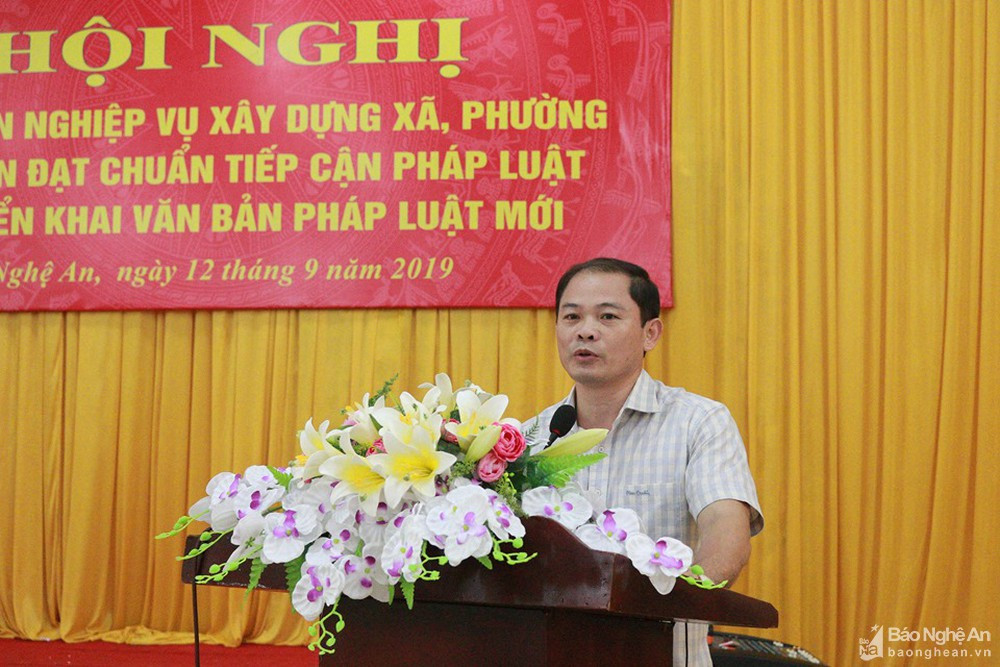 |
| Mr. Pham Thanh Chung - Deputy Director of Nghe An Department of Justice deploys training contents on professional skills to build communes, wards and towns that meet legal access standards. Photo: Document |
Reporter: Could you please tell us about the results after more than 3 years of implementing Decision No. 619/QD-TTg of the Prime Minister on building communes, wards and towns that meet legal access standards in the province?
Mr. Pham Thanh Chung:Implementing Decision No. 619/QD-TTg of the Prime Minister regulating the construction of communes, wards and towns meeting legal access standards, from 2017 up to now, the Department of Justice has advised the Provincial People's Committee to issue documents directing the construction of communes meeting legal access standards in the province. Based on the direction of the Provincial People's Committee, the Department of Justice has organized training for members of the District-level Legal Access Assessment Council and commune-level Justice - Civil Status officials on the professional construction of communes meeting legal access standards. In addition, it regularly checks and evaluates the implementation results to promptly guide, direct and remove difficulties and obstacles in the process of performing this task in localities.
Thanks to the efforts of relevant levels and sectors, after more than 3 years of implementation, up to now, in the province, 335/480 communes, wards and towns have met the legal access standards (reaching a rate of 69.79%). Of which: 34 commune-level units of type I, 209 commune-level units of type II, 92 commune-level units of type III. In 11 mountainous districts, there are 107 commune-level units meeting the legal access standards. The number of commune-level units meeting the legal access standards in the plain districts is 228 units.
The assessment is carried out in accordance with the process and basically ensures the time as prescribed in Decision No. 619/QD-TTg. The documents proving the results of implementing the criteria are systematized and scientifically completed. Facilities and equipment at the Reception and Result Delivery Department and the Reception Office in localities are arranged with attention. Some localities have paid attention to increasing the budget for the dissemination, education of law and grassroots mediation.
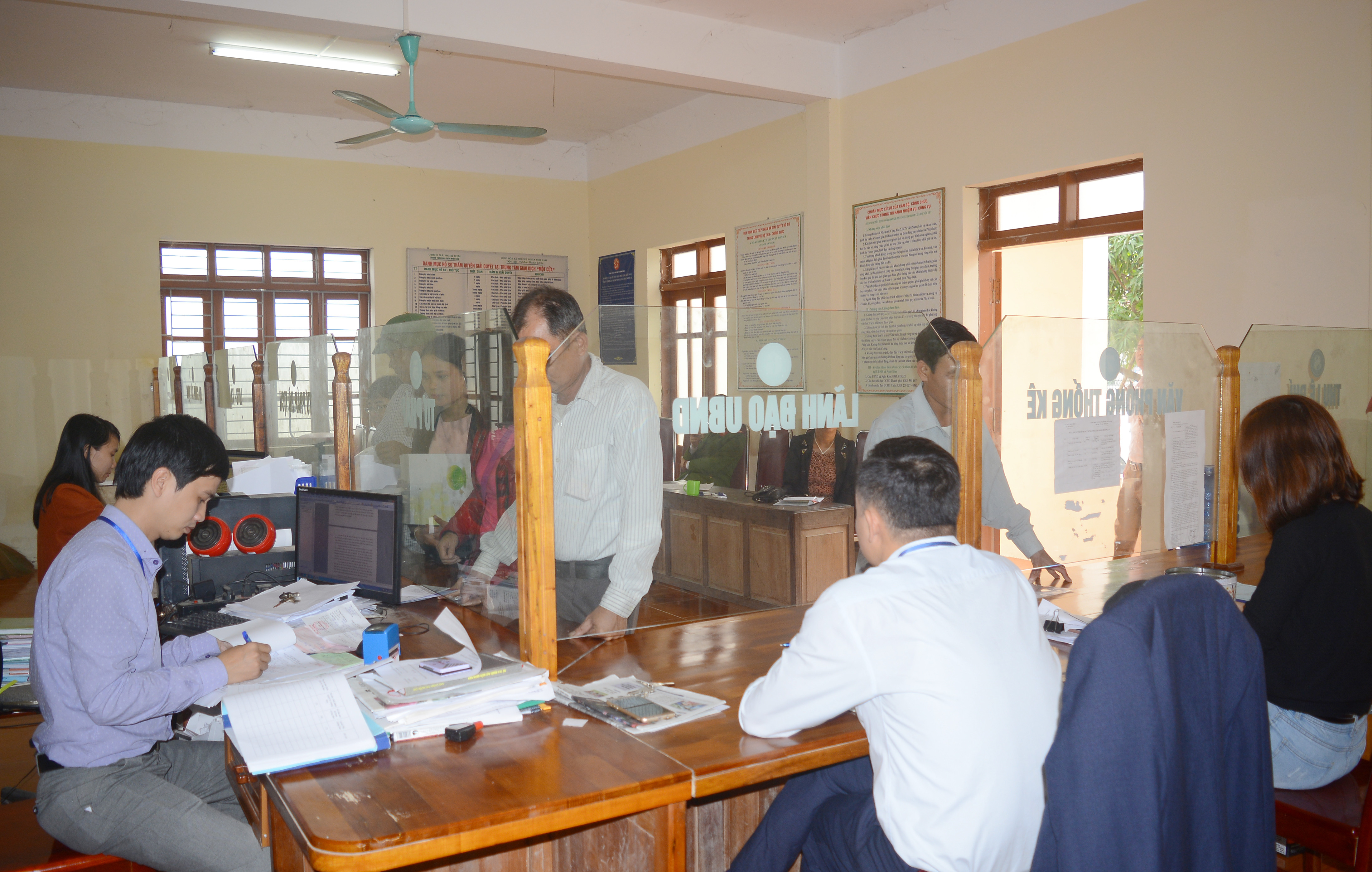 |
| People transact at the one-stop shop of Nghi Kim commune (Vinh city). Photo courtesy |
PV: Besides the achieved results, what are the limitations, difficulties and problems in the assessment and recognition of communes and wards that meet legal access standards, sir?
Mr. Pham Thanh Chung:In addition to the results achieved, the assessment and recognition of communes meeting legal access standards in the past still has limitations. That is: Leaders of some district-level units, especially in mountainous areas, have not been resolute and proactive in directing, monitoring, and guiding communes to build legal access standards.
The assignment and supervision of local authorities towards cadres and civil servants in the implementation of the task of building communes that meet legal access standards is not strict. The activities of the District Legal Access Assessment Council in some places are not substantial. Most of them do not have a mechanism to monitor and evaluate the performance of council members.
 |
| Officials of the Farmers' Association of Quynh Lap Commune, Hoang Mai Town (far right) propagate the Fisheries Law to fishermen. Photo: Document |
Some localities have not paid attention to investing resources to develop criteria to improve the quality of professional tasks and improve the political and legal life of the people. Funding for dissemination, legal education and mediation at the grassroots level in some localities has not been arranged or is limited, which greatly affects the quality of building commune-level standards for legal access...
Therefore, in some localities, the number of communes meeting legal access standards is still low (for example, Quy Chau district has only 2/12 communes and towns meeting the standards; Con Cuong district has 2/13 communes meeting the standards; Nghia Dan district has 4/25 communes meeting the standards...), in particular, according to 2019 statistics, there are some places (such as in Que Phong and Ky Son districts) where there are no communes meeting legal access standards.
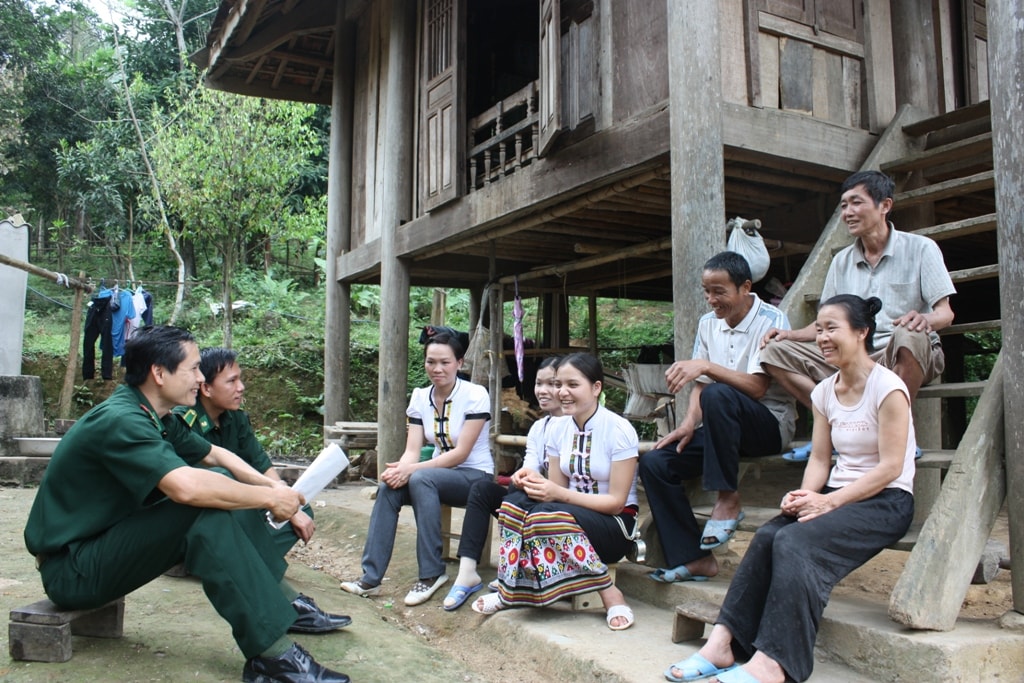 |
| Nghe An Border Guard propagates to raise legal awareness for people in border communes. Photo: document |
In addition, the implementation process still faces some difficulties due to the lack of regulations on monitoring and handling of violations in assessing the satisfaction of organizations and individuals when performing administrative procedures, so the assessment is still a formality. The regulations on time for assessing legal access standards and assessing new rural areas are different, causing difficulties in the assessment process. In addition, there is currently no specific guidance document to build each indicator of the criteria, so most localities are still confused in organizing the construction of communes meeting legal access standards.
On the other hand, Decision No. 09/2013/QD-TTg (the document cited by Circular 14/2014/TTLT-BTC-BTP as the basis for budget preparation, management, use and settlement of funds to ensure legal access standards) has been abolished, leading to Circular No. 14 partially expiring but there is still no circular amending, supplementing or replacing it. Therefore, localities have no basis to regulate expenditures and expenditure levels for this activity...
Reporter: Recently, localities have implemented the merger of communes and hamlets. Does this affect the work of building communes and wards that meet legal access standards, sir?
Mr. Pham Thanh Chung: The merger of communes and hamlets does not affect the work of building communes that meet legal access standards because the criteria for recognition of meeting standards are all based on the regular tasks of the commune level. On the other hand, the Ministry of Justice has provided specific guidance on this issue.
Accordingly, the assessment and recognition of legal access standards for newly established commune-level units shall be carried out from the time the decision of the competent authority or person on the merger, establishment or separation takes effect and shall be conducted annually, from January 1 to December 31 according to the provisions of Clause 1, Article 7, Decision No. 619/QD-TTg. The order, procedures, application dossiers, and authority to recognize the legal access standards of these commune-level units shall be carried out according to the provisions of Decision No. 619/QD-TTg and Circular No. 07/2017/TT-BTP.
PV: So, to improve the effectiveness of assessment and recognition of communes meeting legal access standards in the province, what basic solutions should we focus on?
Mr. Pham Thanh Chung:To improve the effectiveness of assessment and recognition of communes meeting legal access standards in the province, in the coming time, the Department of Justice will continue to promote its advisory role to the Provincial People's Committee to improve the quality of State management in building communes meeting legal access standards. In addition, it will regularly guide and direct district-level judicial agencies to seriously and qualitatively implement the task of building communes meeting legal access standards in association with new rural construction.
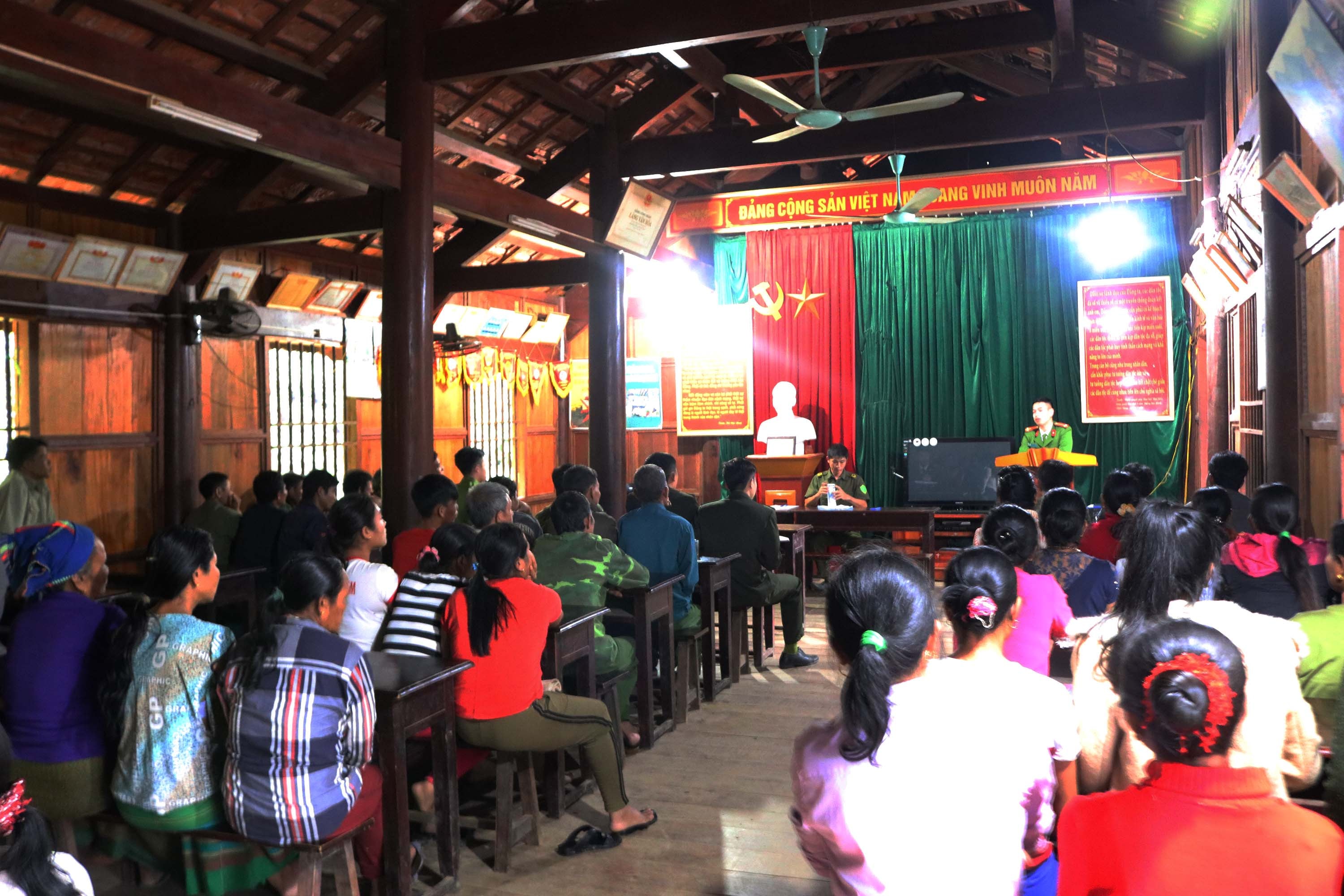 |
| Ky Son District Police organize propaganda to prevent and combat human trafficking for people. Photo: document |
- For district-level localities, it is necessary to strengthen the role of the Legal Access Assessment Council in directing, monitoring, and evaluating to ensure objectivity and close adherence to reality; provide specific guidance for commune-level units to effectively implement the task of building communes, wards, and towns that meet legal access standards, especially paying attention to guiding each legal access criterion. Proactively train local human resources; organize training, seminars, and exchange experiences to jointly resolve difficulties and problems, and improve the quality of task performance.
In addition, the district level needs to step up inspection of commune-level units (which can be integrated into the inspection of judicial work), thereby promptly handling difficulties and problems for commune-level units, and at the same time seeking guidance from the provincial level on issues arising in the process of performing tasks.
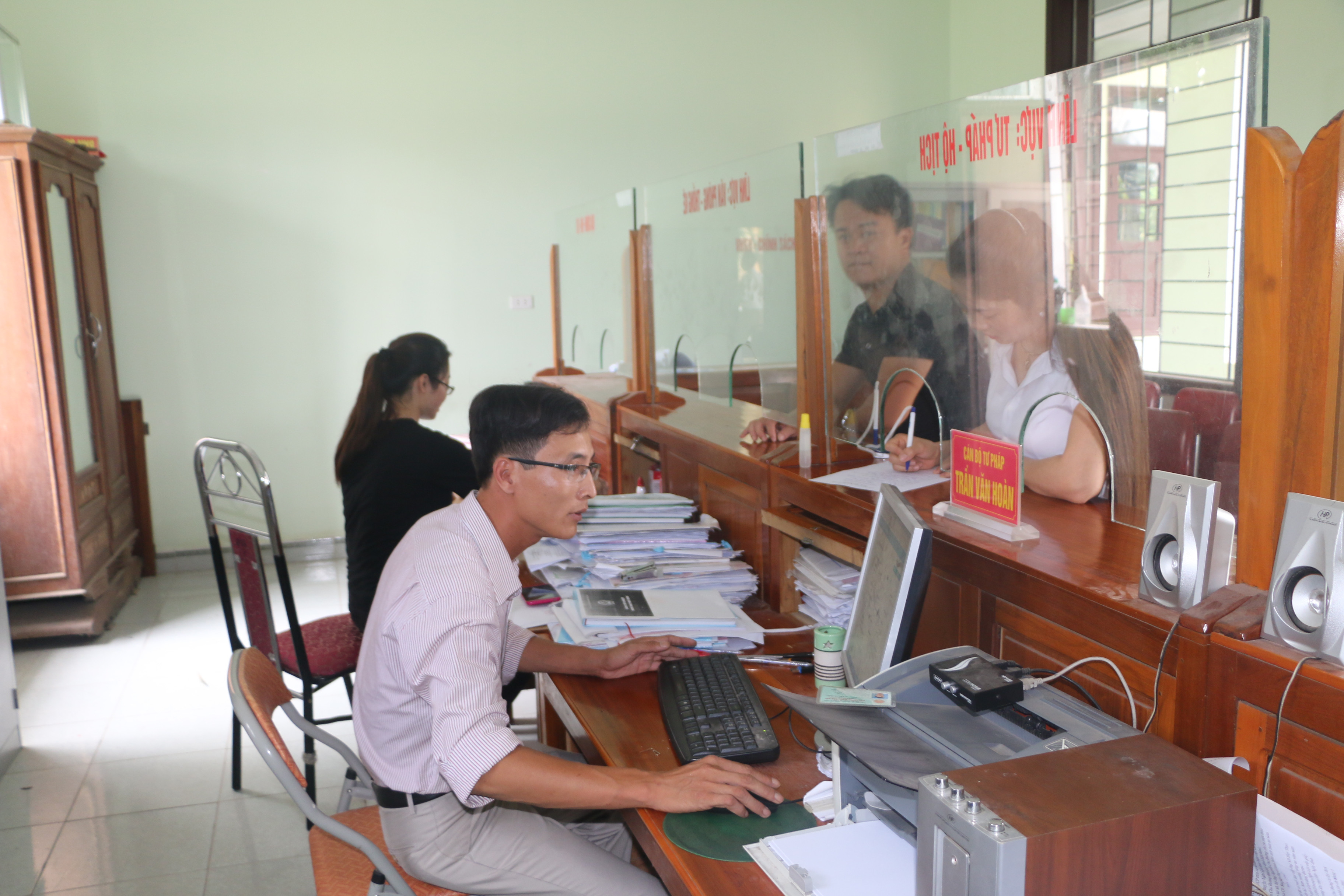 |
| Judicial officers of Nghi Khanh commune (Nghi Loc) carry out household registration procedures for people. Photo: Documentary |
- For the commune level, it is necessary to develop a specific plan and proactively implement the contents of construction and assessment at the commune level based on the guidance of the district level. In particular, the Chairman of the People's Committee at the commune level needs to actively direct and urge civil servants to monitor the criteria and have solutions to improve the quality of task performance, focusing on issuing and fully implementing documents in all fields; resolving complaints and denunciations in the right order and procedures, promptly, not allowing prolonged complaints and denunciations; receiving citizens on schedule; promptly resolving administrative procedures when requested; strengthening the dissemination of laws in many forms to officials and people; investing adequately in mediation work at the grassroots level; ensuring the people's right to mastery.
PV: Thank you very much!
According to Decision No. 619, communes are recognized as meeting legal access standards when they meet:
- 5 criteria (total score of 100) include: Ensuring the implementation of the Constitution and laws (15 points); Implementing administrative procedures under the authority of the People's Committee at the commune level (30 points); Dissemination and education of law (25 points); Grassroots mediation (10 points); Implementing grassroots democracy (20 points).
- 4 conditions include: No criterion is below 50% of the maximum score; The total score of the legal access criteria must reach 90% of the maximum score or more for commune level I, 80% of the maximum score or more for commune level II and 70% of the maximum score or more for commune level III; The results of the assessment of the satisfaction of organizations and individuals with the quality and attitude of service when performing administrative procedures reach 80% of the total maximum score or more; During the year, no commune-level cadres or civil servants were disciplined with a warning or higher for violating the law in performing official duties or had to compensate for damages caused by illegal official acts.


